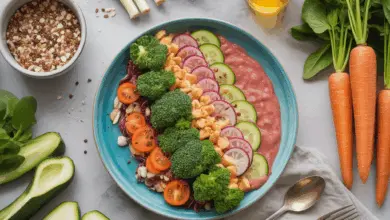Anti Inflammation Diet: Your Ultimate Guide to Reducing Chronic Inflammation Naturally

Have you ever woken up feeling stiff, tired, or achy without any clear reason? Or maybe you struggle with recurring joint pain, digestive discomfort, or unexplained fatigue that just won’t go away? If so, you might be experiencing chronic inflammation — a sneaky health issue that can silently undermine your wellbeing. The good news? An anti inflammation diet could be your game-changer to feeling vibrant, energized, and pain-free.
In this comprehensive guide, we’ll explore what an anti inflammation diet really means, practical food choices you can make today, simple fitness routines to complement your healing journey, and smart lifestyle habits that support lasting health.
What is an Anti Inflammation Diet?
An anti inflammation diet focuses on eating foods that reduce inflammation — your body’s natural response to injury, toxins, or stress that sometimes becomes chronic and harmful. Chronic inflammation is linked to diseases such as arthritis, heart disease, diabetes, and even depression. By choosing the right anti inflammatory foods and avoiding pro-inflammatory triggers, you can help soothe your body from the inside out.
Key Principles of the Diet
- Eat whole, unprocessed foods: Fresh vegetables, fruits, nuts, seeds, and whole grains.
- Prioritize healthy fats: Omega-3 fatty acids from fatty fish, flaxseeds, and walnuts.
- Limit refined sugars and processed foods: These promote inflammation and oxidative stress.
- Incorporate antioxidant-rich foods: Berries, leafy greens, turmeric, and green tea.
- Stay hydrated: Proper hydration supports your immune system and detoxification.
Top Anti Inflammatory Foods to Include Daily
Adding these foods to your meals can help combat inflammation naturally and improve overall health:
- Fatty Fish: Salmon, mackerel, and sardines provide omega-3 fatty acids that fight inflammation.
- Leafy Greens: Spinach, kale, and Swiss chard are rich in antioxidants and vitamins.
- Berries: Blueberries, strawberries, and raspberries pack powerful anti-inflammatory compounds.
- Turmeric & Ginger: Both contain bioactive compounds that reduce inflammation and support joint health.
- Nuts & Seeds: Almonds, walnuts, chia, and flaxseeds provide fiber and healthy fats.
- Whole Grains: Brown rice, quinoa, and oats contribute beneficial fiber and stabilize blood sugar.
- Olive Oil: Extra virgin olive oil offers polyphenols with strong anti-inflammatory effects.
Foods to Avoid: Pro-Inflammatory Culprits
To truly benefit from an anti inflammation diet, it’s crucial to limit or avoid certain foods known to increase inflammation:
- Refined sugars and high-fructose corn syrup
- Saturated and trans fats found in fried foods and processed snacks
- Excessive alcohol consumption
- Highly processed meats and deli products
- Artificial additives and preservatives
Fitness Tips for Supporting an Anti Inflammatory Lifestyle
Nutrition alone isn’t enough to beat chronic inflammation. Incorporating regular movement and smart workouts can further reduce inflammation and improve your body’s healing capacity.
Gentle Workout Variations for Inflammation
- Low-impact cardio: Swimming, cycling, or walking support circulation without stressing joints.
- Yoga & Pilates: Enhance flexibility and mindfulness, reducing stress hormones linked to inflammation.
- Strength Training: Light to moderate resistance training builds muscle, protects joints, and boosts metabolism.
- Stretching & Mobility: Regular stretching reduces stiffness and helps recovery.
Try incorporating at least 150 minutes of moderate exercise per week along with daily stretching routines to keep inflammation in check.
Healthy Lifestyle Habits to Complement Your Diet
Beyond food and fitness, these lifestyle adjustments tremendously impact inflammation levels:
- Manage Stress: Chronic stress spikes cortisol, which increases inflammation. Meditation, deep breathing, or journaling can help.
- Prioritize Sleep: Aim for 7-9 hours of quality sleep to support immune function and tissue repair.
- Stay Hydrated: Water aids detoxification and reduces inflammation.
- Avoid Smoking and Limit Alcohol: Both are major inflammatory triggers.
- Incorporate Mind-Body Practices: Tai chi or mindfulness meditation can ease inflammatory responses.
Real-Life Example: Sarah’s Journey with an Anti Inflammation Diet
Sarah, a 42-year-old teacher, struggled with achy joints and fatigue for years. After switching to an anti inflammation diet that included plenty of leafy greens, fatty fish, and turmeric-spiced meals, combined with gentle yoga practice, she noticed decreased pain and a surge in energy within weeks. Her story highlights how small, consistent changes in diet and lifestyle can yield powerful wellness benefits.
Frequently Asked Questions
Many people notice improvements in energy and digestion within 2-4 weeks, but reducing chronic joint pain or other symptoms may take several months of consistent dietary and lifestyle changes.
Yes! Since the diet emphasizes whole, nutrient-dense foods and reduces processed junk, it naturally supports sustainable weight management which, in turn, lowers inflammation.
While whole foods are best, omega-3 fish oil supplements, turmeric extract, and probiotics can complement your diet. However, consult your healthcare provider before starting any new supplements.
Conclusion: Take Charge of Your Health with an Anti Inflammation Diet
Chronic inflammation doesn’t have to control your life. By embracing an anti inflammation diet, adopting enjoyable exercise routines, and making mindful lifestyle choices, you can reduce pain, boost energy, and reclaim your health. Start small—swap sugary snacks for antioxidant-rich berries, add a weekly yoga session, and prioritize sleep. Before you know it, you will feel stronger, more vibrant, and ready to take on each day with renewed vitality.
Ready to get started? Explore our nutrition guides for healthy recipes, workout routines tailored for all levels, and discover more wellness tips to support your anti inflammatory lifestyle today!





